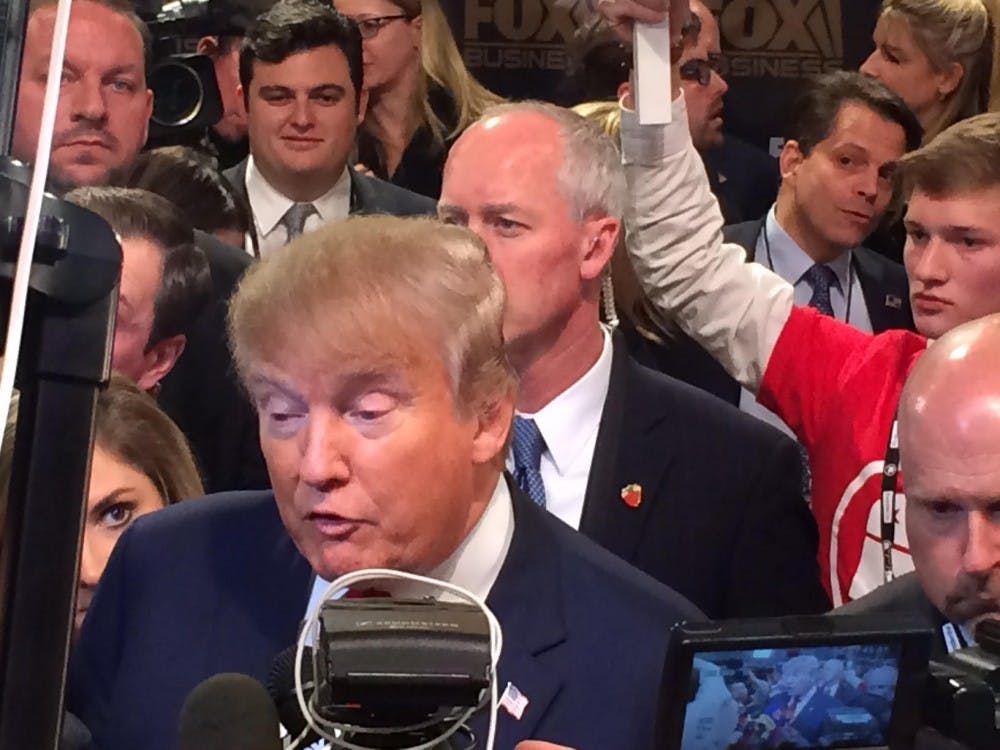Previously having shown friendship toward one another, businessman Donald Trump and Senator Ted Cruz (R-Texas) found themselves on the attack during the Jan. 14 Republican primary debate in Charleston, South Carolina.
Prior to the debate, Trump claimed Cruz would face lawsuits from Democrats because he was born in Canada. He also implied Cruz was not eligible to serve as president. According to Cruz, this was not an issue worth mentioning.
"Back in September, my friend Donald said that he'd had his lawyers look at this from every which way and there was no issue there," Cruz said. "There was nothing to this birther issue. Now, since September, the Constitution hasn't changed. But the poll numbers have."
Trump did not take too kindly to Cruz's zinger. He argued Cruz was overstating his popularity and that he remained No. 1 in all of the important polls.
"In the last three polls, I'm winning in Iowa," Trump said. "You shouldn't misrepresent how well you're doing."
One of the moderators cut Trump off to ask him why he was raising the issue now for the first time.
"Because now he's doing a little bit better," Trump replied.
As the debate progressed, the back-and-forth exchanges only grew in intensity.
Cruz criticized Trump for his close relationship with Democrats and questioned how a Manhattan real estate mogul could possibly be considered a true Republican. He then attacked Trump for being raised on 'New York values.'
"Not a lot of conservatives come out of Manhattan," Cruz said. "I'm just saying."
Trump then invoked the 9/11 attacks to highlight the spirit and resiliency of the state following the aftermath of the national tragedy.
"The people in New York fought and fought and fought," Trump said.
Though Cruz and Trump shared some of the more memorable moments of the night, the remaining five candidates — Senator Marco Rubio (R-Fla.), retired neurosurgeon Ben Carson, New Jersey governor Chris Christie, former Florida governor Jeb Bush and Ohio governor John Kasich — articulated their visions for creating a more stable United States.
Immigration was perhaps the most divisive issue for the candidates.
Carson proposed gathering a group of experts from other countries to learn more about how to improve the immigration screening process.
Cruz claimed Rubio was not strong on the issue because he was a member of the Gang of Eight, a bipartisan group of eight senators who wrote the 2013 comprehensive immigration reform bill.
On June 27, 2013, the immigration bill passed in the Senate by a final vote of 68-32. The bill provided a pathway to citizenship for millions of undocumented residents. Cruz said Rubio's amnesty bill expanded Obama's agenda.
Rubio responded that Cruz has flip-flopped on immigration issue. Cruz replied he is strongest candidate with regard to immigration and he would never support amnesty.
While all the candidates advocated for stronger border control, Trump reaffirmed his position on banning Muslims from entering the U.S.
"We have a serious problem and we can't be the stupid country anymore," Trump said.
Bush argued Trump's proposal is 'un-American' because it goes against national values of providing immigrants pathway to fulfilling the American Dream. Bush also said a temporary ban of Muslims would alienate the global community and prevent the U.S. from forming much-needed Arab coalitions to fight ISIS.
"We're running for presidency of the U.S," Bush said to Trump. "This is a different kind of job. You have to lead. You can't make brash statements."
Kasich disagreed with banning all Muslims but said he would support a ban on letting in Syrian refugees. Christie agreed Syrians shouldn't be allowed into the country.
Trump countered that his plan is necessary and that law enforcement officers are afraid to enforce the rules because they fear they will receive backlash for their actions.
"The police are the most mistreated people in this country," Trump said.
With the election year underway and New Hampshire primaries and Iowa caucuses quickly approaching, the candidates await the next debate Thursday, Jan. 28 in Iowa.


